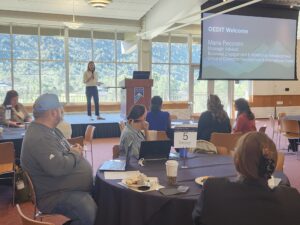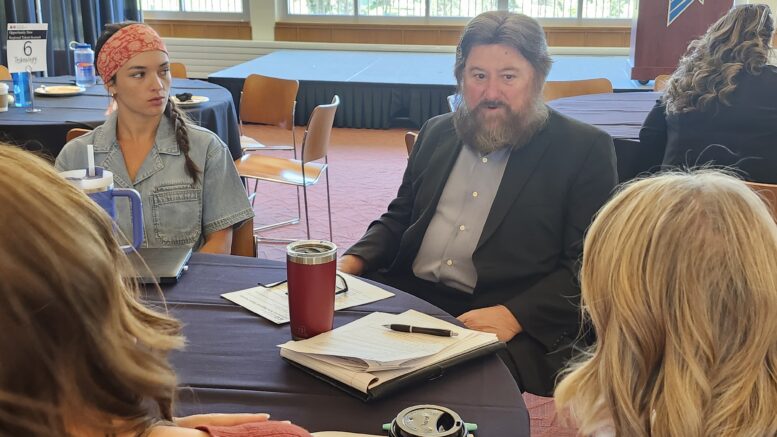In the 11 counties of Southwest Colorado and the San Luis Valley, businesses tend to be smaller and educational institutions more widely dispersed, making communication between employers and schools on career and skill needs somewhat of a rarity.
So, when business and school leaders gathered Friday in Durango for the fifth of seven planned regional talent summits, both groups wanted to talk about how they can form partnerships to ensure that students are learning the most relevant job-focused skills. And that in turn could help to ensure that those students, many of whom do not seek to go directly to four-year universities, can know about the variety of opportunities that are available to them and prepare earlier for getting into those high-demand fields.
Together those groups also could raise their voices to state officials about what’s impeding talent development, like excessive paperwork demands on potential apprenticeship suppliers and regulations that keep high schoolers from working in agriculture. And suddenly, you could have a more connected regional economy and one that serves students and communities better by ensuring direct pipelines to jobs and creating talent pools needed to fill crucial roles in health care or technology.
“Some students don’t know what jobs exist,” said Ray Johnson, a corporate citizenship and corporate affairs manager for IBM who helped 10 years ago to establish the state’s first P-Tech program offering career pathways through a public-private partnership. “Hopefully, this can help connect business and education and align them a little closer around the skills that are needed in today’s workforce.”
How the regional talent summits work

Marie Pecoraro, strategic advisor for business engagement and workforce advancement at the Colorado Office of Economic Development and International Trade, welcomes attendees to Friday’s summit in Durango.
The business-led Education to Employment Alliance worked with the Colorado Office of Economic Development and International Trade to set up the seven Opportunity Now Regional Talent Summits, which will continue in different areas through mid-June. Employer and educators in three priority industries in each region come together at the one-day events to discuss talent shortages in those sectors and create two- and five-year plans laying out how they will work together to fill those talent gaps.
While the three priority industries chosen for the southwest and south-central region — agriculture, healthcare and technology — have different needs, they share a common desire to build more intra-sector partnerships to communicate with educators. Doing so not only would give smaller companies more leverage in helping to work with schools on curriculum development and work-based learning programs but could connect small schools with a larger range of employers in the area.
As such, tech-sector representatives recommended the creation of intermediary groups — led by local chambers of commerce or industry associations — to aggregate employer needs and help to set up new career-readiness programs and internships with schools. While local employers could help to develop skills particularly needed for one part of the region, such as broadband laying and splicing as rural areas prepare for expansion of that infrastructure, the skills should be transferable across a variety of jobs, they said.
“We love to help train students, but we don’t have the time to facilitate a program with the high school by ourselves,” said Jeff Pollard, vice president of personnel for Deeply Digital and Clearnetworx, a Montrose-based internet service provider with 240 workers. “Hopefully, someone else wants to be involved as well.”
Unique needs of agricultural sector

Elizabeth Philbrick, president/CEO of EsoTerra Ciderworks, discusses agricultural needs at Friday’s Opportunity Now Regional Talent Summit in Durango.
Agricultural attendees at the summits also expressed a desire to form a regional sector partnership, which could help them to apply for industrywide grants to build shared facilities like a meat-cutting training center. That sector also has a unique need for housing seasonal employees, but that too would have to be a shared cost, as only very large producers can afford to provide year-round employee housing without sinking their bottom line, said Elizabeth Philbrick, president/CEO of Durango-based EsoTerra Ciderworks.
But just as important as establishing its own training facilities and then working with local schools on agricultural courses, the industry needs a shared voice to push back against recent overregulation, numerous industry leaders said. An agricultural worker’s bill of rights that was passed three years ago essentially makes it impossible to boost the working hours needed for high-school students to get their start in the industry and preserve the shrinking number of farms, and a partnership could help to explain those needs, they said.
“If we want to inspire more young people to be entrepreneurial agriculturalists, then we need to make sure this is an industry that is not impossible to get into,” said Philbrick, arguing that the state needs to do more to help farms understand permitting processes. “It costs as much right now to build an advanced industries facility as it does a vegetable-washing station.”
Healthcare career pathways must be expanded

Abby Ault, principal consultant at Innovate Work Consulting, leads healthcare-sector providers in developing talent plans at Friday’s regional summit in Durango.
Suggestions offered by sector participants for the two-year plan include creation of a one-page career map for students overlaid with the credentials they need to enter the industry, establishment of a sector partnership and creation of a campaign to promote the sector. The five-year plan, they offered, should include creation of an advisory committee to rewrite burdensome industry regulations, creation of more work-based learning opportunities and establishment of more financial aid to help startup and growing farms.
Healthcare leaders said two key changes are needed to grow the workforce in the region — creation of more work-based learning opportunities to teach students about the array of career options and expansion of program enrollment caps at higher-education institutions. The immediate plan would involve building awareness of options that don’t require four-year degrees, followed by creation of opportunities to move students from internships and apprenticeships into careers where they get salaries as they build credentials.
To do this, sector leaders need to band together to seek financial help, either from the state or from investors, that can help healthcare providers pay students during externships, as too many learners can’t do that work now because they can’t afford to learn without pay. At the same time, the sector must work with the state to reduce reporting mandates around apprenticeships that are so cumbersome that Pagosa Springs Community Development Coordinator Emily Lashbrooke said she knows companies that have chosen to forego the opportunities rather than spend the time documenting every hour spent by students.
What comes next in career skills development
“I could have had plumbers, farmers, technicians all working with local companies and preparing for careers,” Lashbrooke said, noting the wide range of career pathways that could take advantage of easier-to-access apprenticeship programs. “I could have had the whole apprenticeship structure set up, but it was too labor-intensive.
Innovate Work Consulting, the third-party facilitator contracted by the state, will work with summit attendees to put together a detailed tactical action plan based on suggestions from the event. Regional hosts — in this case, the La Plata Economic Development Alliance, Fort Lewis College and The Attainment Network — then will work with local businesses and workforce boards to ensure that the suggestions get implemented.
The final two summits are scheduled for June 3 in Edwards for mountain communities and then on June 13 in Colorado Springs for the Pikes Peak region. The focus industries for the mountain-region summit, hosted by Vail Valley Partnership, will be construction, healthcare and tourism; for the Springs-area summit, hosted by the Pikes Peak Workforce Center, they will be advanced manufacturing, aerospace/defense and technology.
